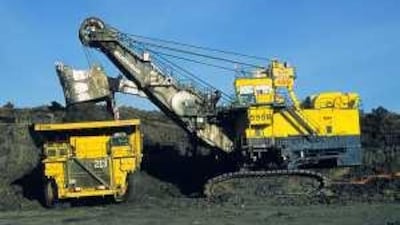From an oil price perspective, this year looks like 2007 all over again. Or is it? A glance at historical price charts reveals the striking similarity between two years ago and now. In both 2007 and 2009, crude rose steadily between mid-January and June, reaching US$70 a barrel by mid-year. The ascent has been somewhat steeper this year, starting from $35 a barrel instead of $50, but the trajectories and the year-to-date end points have been much the same.
Crude last week hovered in the low $70s, just a few dollars shy of the $75 a barrel that Saudi Arabia's King Abdullah said last year would be a fair price, and which many oil industry executives have agreed would be sufficient to revive investment in new supplies. So why is the mood still so sombre in the oil industry capitals of the world, from Houston to Riyadh and Abu Dhabi? Two years ago, the boardrooms of international oil companies were brimming with optimism, as were the governments of existing oil-exporting states and several countries that hoped soon to join their ranks.
In Ghana, Tullow Oil, a UK oil producer, had made an initial offshore discovery of between 1 billion and 1.8 billion barrels of crude, which was soon followed by two more oil strikes. The Ghanaian government was eagerly anticipating annual oil revenues of more than $1 billion (Dh3.67bn), starting next year. Brazil was abuzz with news of a string of huge deepwater oil discoveries off its coast, and the plans of the state-controlled oil company, Petrobas, to develop a domestic oil and gas industry to complement the country's booming sugar cane-based biofuels business. OPEC began making overtures, courting Brazil as a potential member of the oil exporters' group, which controls 40 per cent of world supplies.
In Canada, oil sands producers were planning to invest a record C$19.7bn (Dh63.92bn) last year to extract more of the world's most expensive crude, a 23 per cent increase from 2007. The sum involved, according to the government's data division, Statistics Canada, exceeded the total investment plans of all the country's manufacturing industries put together. A study by Harrison Lovegrove, the oil and gas finance adviser, found that investment in oil sands projects had doubled in 2007 from the previous year, bringing strong growth in the figures for oil reserves. Oil development spending in the Middle East and Africa also rose sharply, helping to drive up global development spending by 20 per cent to a record.
Contrast that to what is happening this year. OPEC reports that 35 major oil projects in member countries have been cancelled or postponed. At an OPEC conference in Vienna in March the influential Saudi oil minister, Ali al Nuaimi, pleaded with consuming nations not to give up on oil as a major energy source for the world. He voiced concerns that government programmes in advanced economies aimed at stimulating renewable energy development could prematurely shift investment away from oil, resulting in a future supply crunch. The International Energy Agency, while urging massive investment in renewables, has repeatedly warned that a contraction in oil development spending could lead to a future sharp price rise.
In Canada, a bellwether of global industry spending intentions, the oil sands sector has gone from boom to bust in months, with an estimated $200bn of long-term development plans derailed. Brazil, another high-cost oil producer, has had to turn to China for financial help with developing its offshore fields, recently negotiating a $10bn credit line backed by a long-term agreement to supply oil products to Sinopec, the Chinese state-owned oil refiner.
"There is a serious lack of money in the industry," Aidan Heavey, the chief executive of Tullow, said at an energy summit in London earlier this month. At the same conference, Jean-Jacques Mosconi, the head of strategy and planning for the French energy group Total, said big oil companies were doing their best to carry on with long-term investment, but smaller firms were having problems financing projects.
Steve Farris, the chief executive of Apache, an independent US oil company involved, among other things, in Ghana's nascent offshore oil sector, said weak oil demand would keep energy prices soft in coming months. In a word, the big difference between the oil industry's situation now and two years ago is confidence. In mid-2007, surging energy demand in the emerging economies of Asia and the Middle East seemed certain to support strong oil prices for as far out as anyone cared to forecast. No one foresaw that the following year a perverse escalation in prices just as oil demand was faltering in developed economies would help trigger the worst global recession in decades.
Now, many oil executives look sceptically at this year's 60 per cent rise in oil prices. "I don't see the consumption, I don't see the reason why oil prices should move up again," said Paolo Scaroni, the chief executive of the Italian oil firm ENI. In 2007, oil prices continued to climb in the second half of the year, ending the year at $96 a barrel. I think we would all settle for a repeat of that.
@Email:tcarlisle@thenational.ae

